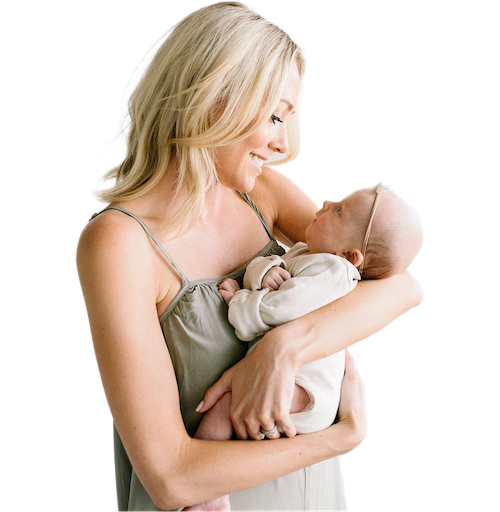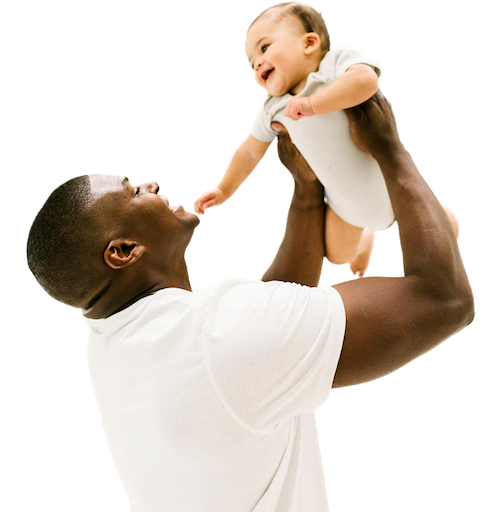Do you have a newborn who is making noises or constantly moving during sleep? We call this active sleep. I’d love to share some of the most common questions I get about why your newborn is loud during sleep, what active sleep looks like, and how to help yourself get some sleep even if your baby is a noisy sleeper.
Taking Cara Babies Classes
stars ( reviews)
Wondering how to achieve great days and nights? I can help. My classes will meet your little one right where they are developmentally and give you the tools you need to have a great little sleeper.
Choose your little one's age to get started:
My newborn is always making grunting sounds and squirming while sleeping. Why is my baby moving or making noises while sleeping? anchor
Newborns go through two different sleep cycles: quiet sleep and active sleep, and they spend about half of their sleeping time in each.(1,2,3) Active sleep is similar to REM sleep for adults, but there is one huge difference:
For adults, our skeletal muscles are paralyzed during this stage — for young babies, they are not. Instead, babies move around, make noise (grunting noises and cries), and sometimes even open their eyes, all while they're actually sleeping!(1,3)
During these early months, your baby’s brain and body are still working hard to learn vital skills, like digestion, even when they’re sleeping. With all of that hard work and development happening during active sleep, we can expect to see your baby consistently moving as well as making grunting sounds, moaning, and even occasionally crying out.
Expert Tip: Parents often use the word grunting as a general term to describe baby noises (ie. grunting sounds). However, among healthcare professionals, the term “grunting” specifically refers to babies experiencing distress as they try to breathe.
While some noises during your newborn’s sleep are perfectly normal parts of active sleep, other noises can be an indication of sickness, discomfort, or distress.
What does active sleep look like in babies?anchor
Will you watch this video? Turn on the sound. I want you to see what newborn sleep can really look like! Newborns can be SO active while they sleep.
If you heard that in the night, would you hop out of bed and immediately pick up that baby? Did you know that doing this could be unintentionally waking your baby at night? Let me explain.
All of these babies are moving and may even cry out. But...they are all asleep! This is active sleep. Active sleep can be why you swear your baby is awake from 3:00-6:00 am “fighting the swaddle” or struggling with gas. If you mistake this active sleep period as baby being awake and jump in right away, you may accidentally wake your baby!
So, if you’re hearing your baby making grunting sounds, moaning, or whimpering in their sleep, know that these are typically normal newborn active sleep sounds. However, if your baby is sick, sounds congested, or you’re concerned about whether what you’re hearing is normal, please check with your pediatrician.
Wait, Cara! Are you telling me not to go help my crying baby in the night?anchor
No! Not at all! If your baby needs you, you will respond. But before we respond, we simply stop and observe.
Take a moment to listen to your baby before you react. Give your baby 30-60 seconds before you rush to pick them up. This will help determine if your baby is just going through that active sleep or if your baby is actually awake!
Expert Tip: If your baby is breaking out of the swaddle during active sleep, check out my tips for swaddling.
Should I ever be concerned about my baby making noises while sleeping?anchor
Although many noises your newborn makes during active sleep are completely normal, there are some noises that may be cause for concern. If you're seeing any of the following, it's time to call your doctor or seek medical attention:
High-pitched, squeaking sounds(4)
Rapid breathing that is greater than 60 breaths per minute(5) and lasting more than a few seconds or happening repeatedly throughout the night.
Struggling to breathe. This may look like retractions (ie. sucking in between or underneath your baby's ribs), grunting after every breath(5), or labored breathing.
I understand it may be difficult to know what’s a normal sign of active sleep and what may be something more. If you have any concerns about your baby, please always talk with your pediatrician.
How long does newborn active sleep last? anchor
Newborns spend nearly half of their sleep time in active sleep.(1,3) With newborn sleep cycles lasting about 50 minutes, nearly 25 of those minutes are in active sleep.
When do babies outgrow active sleep?anchor
You’ll likely notice that your baby is making much less noise while sleeping after those newborn months have passed. Around the time your baby is 3-5 months old, their sleep cycles begin to shift into more adult-like sleep stages.(2,3) It’s during this change that active sleep decreases.
Expert Tip: Even as your little one shifts into more adult-like sleep cycles, you may still see quite a bit of movement. Those active little sleepers typically become much more settled in their sleep around age 5.
My baby is active, noisy, and making grunting sounds in their sleep. And with all of this going on, I can’t sleep! What can I do? anchor
Your sleep is vital to the overall well-being of you AND your baby. So, now that you know all about newborn active sleep, here are some tips for how to make it less disruptive during the night:
Move the bassinet farther away from you. (Think across the room or even in your closet or bathroom if it’s well-ventilated.)
Set up the sound machine (use code CARA20 for 20%) between you and your baby.
Turn down the volume on the monitor if your baby is sleeping in a different room.
Are you wondering about when to move your baby into their own room? My blog about room sharing goes into depth about the research regarding room sharing and will help you decide when the time is right. When you're ready, here's a step-by-step guide to transition baby from your room to the nursery.
If you need more help with your baby's sleep, my no-cry Will I Ever Sleep Again? newborn class will give you the tools you need. I’ll guide you every step along the way in laying a healthy sleep foundation for your little one.
References
5 Sources
Wielek et al. (2019). On the Development of Sleep States in the First Weeks of Life
Patel et al. (2022). Physiology, Sleep Stages
Shakankiry, H. (2011). Sleep Physiology and Sleep Disorders in Childhood
McClay, J. (2022). Stridor & Laryngomalacia: Is My Baby’s Noisy Breathing Serious?
Reuter, Moser, and Baack. (2014). Respiratory Distress in the Newborn
Keep in mind that the information and content on this blog is for informational purposes and should not be considered medical advice. If you have questions about your child, please reach out to your doctor.








